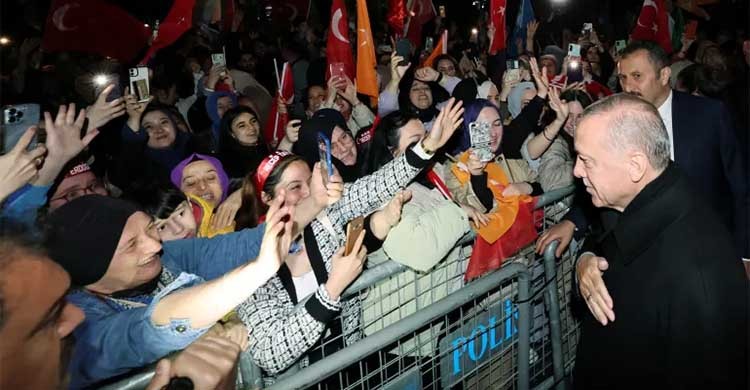As Turkey heads to a presidential election run-off, what’s next?
16 May 2023, 09:06 pm | Updated: 31 March 2025, 04:15 pm

After a hotly-contested first round of elections on Sunday, Turkey will have a run-off vote on May 28. Analysts say incumbent candidate Recep Tayyip Erdogan has an edge over the opposition’s Kilicdaroglu, reports Al Jazeera.
Here’s what we may see happen next:
What can we expect from the run-off?
Analysts predict that incumbent candidate Recep Tayyip Erdogan is more likely to win in a second round as he garnered a five-percentage point advantage from Sunday’s first-round vote against his main contender, Kemal Kilicdaroglu.
With more than 99 percent of votes counted, Erdogan had received 49.51 percent of the vote, electoral chief Ahmet Yener said. Kilicdaroglu had secured 44.89 percent, according to Yener, citing results from the Supreme Election Council.
Overall, Erdogan performed better than expected, with his alliance also managing to secure a majority in the 600-seat parliament.
Political analyst Ali Carkoglu said Erdogan has “the momentum behind him” following those polls.
“Erdogan maintained his base of support in the heartland of Anatolia, although he lost some support in the southeast … He also maintained some credible level of support in the big cities,” Carkoglu told Al Jazeera.
“He was very successful also in the earthquake-hit regions. Some people find it surprising, but he apparently delivered what they expected of him and promises that he will deliver even better in the aftermath of the election,” the analyst added.
Meanwhile, there are some members of the opposition who are disappointed with Kilicdaroglu and consider him the wrong candidate as he was not able to chip away the conservative votes, Al Jazeera’s Zeina Khodr said.
As for the third-place candidate, Sinan Ogan, he did better than expected, becoming a potential “kingmaker” who could play a pivotal role in the outcome of the second round if he endorses one of the two candidates facing off.
Ogan has yet to make any such endorsement. Onur Erim, an analyst at Dragoman Strategies, told Al Jazeera that he will want ministries or vice presidencies in exchange for an endorsement.
What are the opposition’s challenges?
The opposition alliance will have its work cut out for it in reassuring its supporters that it is the alliance that can take Erdogan out, given how dismayed they are about the results of the first round.
Dozens of opposition officials were shocked at the poor result and are scrambling to rethink strategy, they told Reuters news agency.
The opposition will have to appeal to factions of the population who are questioning Kilicdaroglu’s alliance with the pro-Kurdish Peoples’ Democratic Party (HDP), which the Turkish government considers to be a political wing of the Kurdistan Workers’ Party (PKK). The PKK has been fighting the Turkish state since the 1980s, during which time tens of thousands have died.
But that may be a challenge, as Erdogan has linked the opposition to the PKK. At a rally before Sunday’s vote, he showed his supporters a fake video of a PKK commander singing an opposition campaign song.
“We have two weeks. We need a quick recovery,” one official told Reuters.
What would an Erdogan victory mean?
An Erdogan win would grant him a third term, extending his two-decade rule and in continuation of him being the longest-serving leader the country has known.
Under him, Turkey would see a continuation of the presidential system that was adopted in 2018.
To relieve rising living costs, he has promised to introduce subsidised energy bills and hikes to pensions, public workers’ salaries and the minimum wage. Additionally, he will lower interest rates to tackle the country’s economic crisis.
Erdogan also said he will wage an independent foreign policy that will continue to influence the region and elsewhere in Africa and Central Asia.
Still, his critics say he has stifled dissent in the last decade of his rule, especially by cracking down on opposition groups.
What would a Kilicdaroglu victory mean?
A Kilicdaroglu win would symbolise the yearning of large parts of the electorate for change and would change Erdogan’s reputation as the country’s most electorally successful politician.
The centrist leader is promising a return to a “strong parliamentary system”, a solution to the “Kurdish issue”, a return of Syrian refugees back home, and closer relations with the European Union and the United States under a more muted foreign policy.
While promising further democratisation, the opposition has also said it will return to more conventional economic policies in a manifesto under the banner: “I promise you, spring will come again.”
Still, Erdogan’s parliamentary majority will mean that the opposition will have a tough time passing legislation in the Grand National Assembly.






















